#it's the earnest personality trapped in repressive circumstances
Text
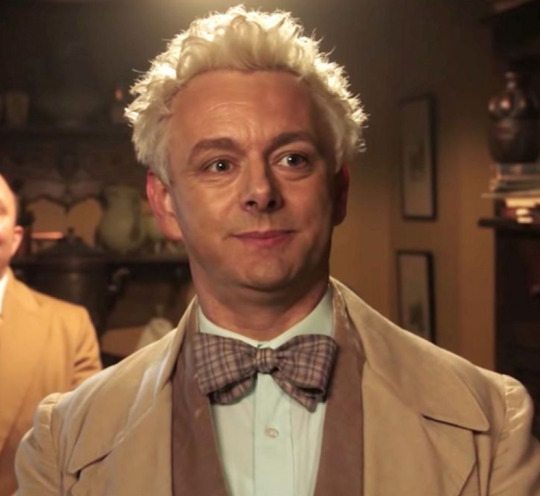

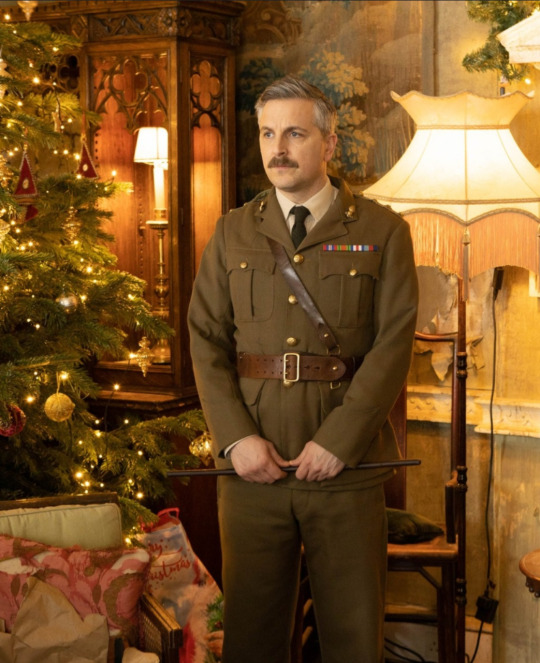
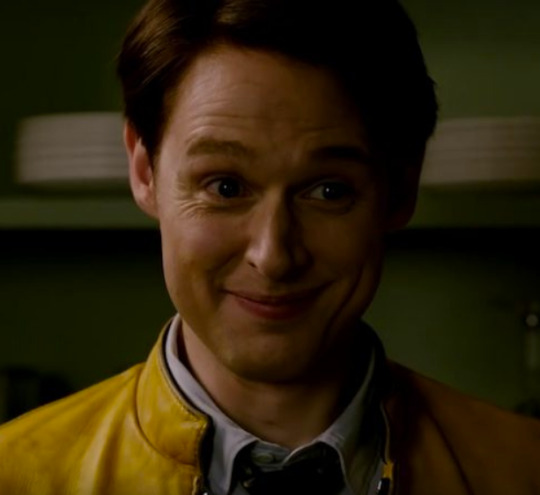
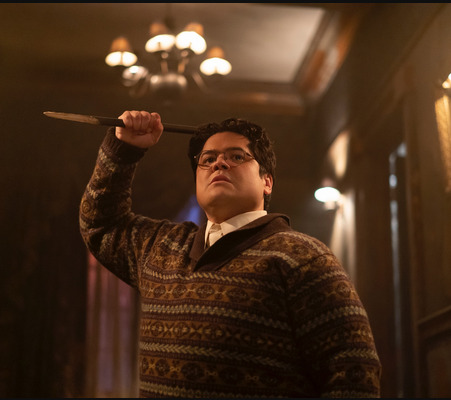
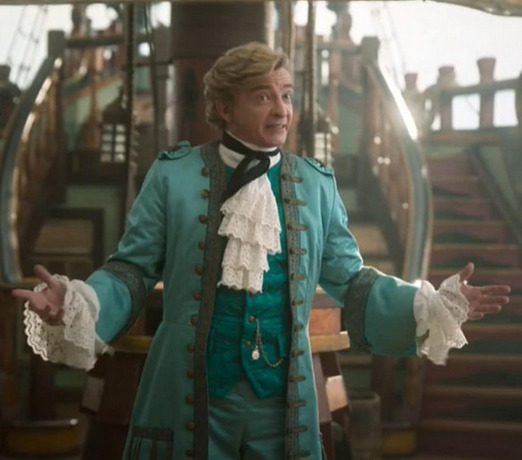
I'm terribly predictable and I don't like it
#it's the earnest personality trapped in repressive circumstances#presented with comedic overtones and tragic undertones#don't mind me I'll just go melt in the corner#cause it sure as hell ain't straight#maddie debrief
4 notes
·
View notes
Text
BnHA Ch. 323 - parallels and comparisons
Most important thing first: Mic name-calls “Jeany” after Best Jeanist interrupts him and insults the UA teachers, saying the citizens find it hard to hear the truth from schoolteachers. Excuse me, PRESENT FUCKING MIC IS A PRO HERO WHO FOUGHT IN THE WAR AND ARRESTED THE DOCTOR. Ultimately, Jeany is trying to take responsibility, which is good, but the way he does it is insulting. Is that really how the Top 3 feel about the UA teachers? (This started out shitpost-y, but I think it does actually matter….)
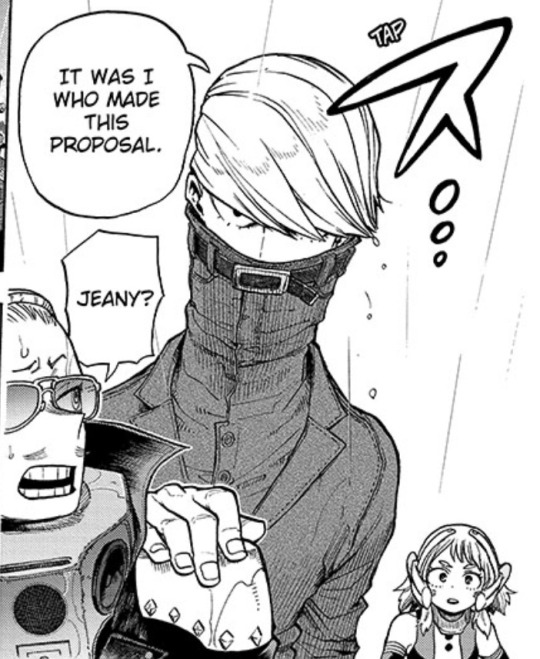
On to Nezu, who, despite all his well-repressed rage, is still just a rat principal building a cage. He’s created an elaborate mecha-vault-campus to capture save humans and transport them around the country like Willy Wonka’s great glass elevator. Nezu says he did this on intuition, yet that can’t be the full story because his High Specs quirk gives him great insight into possible strategies the villains will use. In fact, the last time we saw his quirk in action, he was trapping 2 students in a maze, gradually blocking off all paths to the exit. Oh, and who else in BnHA is seemingly able to predict their opponent’s strategies and enjoys doing so? I’m not saying Nezu is “The UA Traitor,” particularly given his speech at the end of the chapter, but I AM saying there are parallels.

In particular, Nezu seems to do a lot of work related to quirk morality, while AFO refers to morals as mere fabrications.

Sticking with Nezu and jumping to the end of the chapter…this isn’t the first time he’s made a grand speech about UA students and the future. After DvK2, while Izuku and Katsuki are under house arrest, Nezu speaks to the school about All Might’s retirement and says how all of the students will “inherit this society.” The word “inherit” makes All Might think about his successor, and how Nezu reached out to him when he was searching in earnest (ie, when Nezu and Nighteye had Mirio picked out). Nezu’s “one step” language also ties back to an All Might monologue from the remedial course days — when Shoto, Katsuki, and the Shiketsu kids worked together to win tiny hearts AND All Might and Endeavor had their first real talk, leading Endeavor to reach out to Shoto.

Speaking of the remedial class moving forward, the Katsuki/Shoto “we are not friends” mutual side eye at the mention of Shiketsu is A Moment. Will the remedial foursome be trapped in an underground classroom!??!?

I think it’s clear that the heroes — pros, teachers, students — need to work together as one to win over “the citizens”. The heroes also need their supporters (hello kid in an All Might shirt!), parents (omg, Mitsuki holding Inko back from recklessly running into the crowd like the Midoriya she is!), friends, and rescued victims to take those steps to come forward. Izuku is moving forward for them, and they need to move forward for him.

I’m not convinced that Nezu’s “ultimate hero” is Izuku; it could be Katsuki, Ochako, Shoto, Mirio (hello underground permeation!), Shigaraki, Class 1A, or the entire “new generation”, judging by his “inherit” comment. Izuku is All Might’s chosen one to inherit OFA, but Izuku is NOT the only one inheriting society’s future. Special, but also not. (More on that later!)
Final bit on the mecha-school…I don’t think anything good in this series has come from being “underground”. I think we’ve already established that “underground” is neither safe nor invincible. Underground Yakuza compound. Underground prison. Underground hero (sorry Aizawa!!) Even when talking about the “ultimate hero,” Nezu speaks in terms of rising.
The text leaks said Eri was with Class 1B, which made me frustrated, but the panel is actually a lovely soft Monoma comforting her. It’s really sweet and shows off Monoma’s heroic heart! (And his off-duty fashion sense, because those buttons add some serious dramatic flair.) But, knowing that Aizawa, All Might, Mic, Thirteen, and the Big 3 are Eri’s usual caretakers makes me really sad for her — why are they ALL gone?? Especially when (1) she’s listening to a crowd call her personal hero a weapon with a cursed quirk, exactly how Chisaki used to talk about her; and (2) Izuku doesn’t HAVE to be the one taking care of her, but I think they’d both LIKE to see each other.
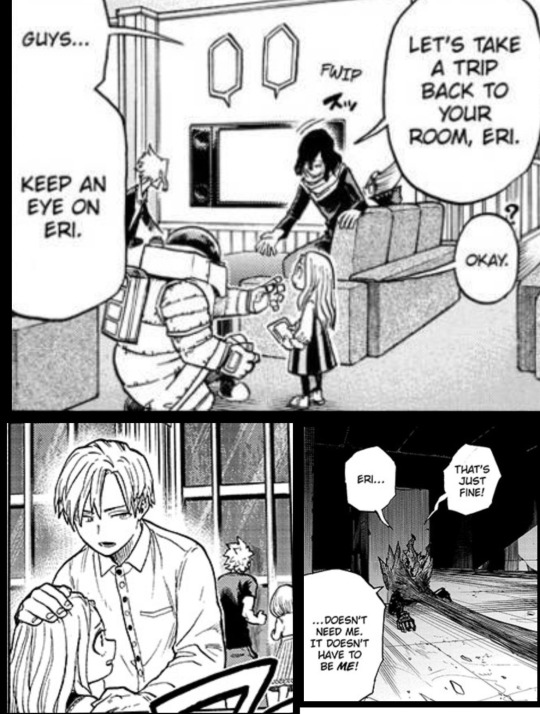
Speaking of the crowd, I do like having “the citizens” as a character. In the early chapters, we heard so much about protecting citizens and keeping society from falling into chaos, but it was all theoretical. With the jailbreak, the war destruction, and Dabi’s reveal, it’s good to see citizens who (1) question the value and robustness of the current hero society; and (2) are scared out of their minds. “The citizens” may be an obstacle for the heroes, but their fear and motivation is very rational under the circumstances. People who were forced to evacuate their home on short notice and hole up in a dormitory while skyscrapers crumbled due to villains gone wild (and, uh, Deku) are unlikely to trust the same people who created this mess in the first place. While WE know and love cinnamon roll Izuku, “the citizens” only know him as the target of Shigaraki’s destruction. He’s billed by Jeany as the One True Hope but the citizens know him as a dirty teenager insane enough to break his own bones in a school competition. He’s somehow related to AFO and is either a bomb for AFO, a Nomu-fied corpse doing AFO’s bidding, a target for Shigaraki, or a weapon against AFO that is falling apart at the seams. None of that is reassuring, so I can see why the crowd gets mad enough to make Izuku’s Danger Sense go off. The heroes need to take a moment to really empathize and understand the crowd’s fear and anger.

What’s missing from this scene? ALL MIGHT. The focus on Deku and the OFA/AFO quirks completely omits that Izuku is All Might’s handpicked successor, and that All Might used OFA as a force for good for decades. Jeany and Ochako confirmed Izuku is the special powerOFA holder, so it’s all out in the open except for how Izuku came to possess OFA in the first place. So much for Mt Lady and Endeavor’s media discussion in Ch.317! Also, as Lady Nagant told us, the HPSC was well aware of AFO and tracked his movements. AFO may have been a secret from the public, but was NOT a blind spot for heroes. Same with Gigantomachia — Gran Torino and Tsukauchi failed to capture him, but they knew of him and his association with AFO. (Nobody, including All Might, knew about the doctor and his quirk duplication prior to Hawks’s spy work and the hospital raid.)
I want to see all of this come into the open because the hero failures stem from All Might working alone in secret to stop existential threats while other heroes fought each other for table scraps. (Think of Manual, who is such a plain and underpowered hero, but was clutch during the war.) Heroes STILL aren’t working together, and to fight dual AFOs they are going to need every last bit of help they can get from each other, from students, and from citizens — quirked or not. Anyone who is willing or able to help should join in.
Unease is referenced in this chapter, and unease is what happens whenever All Might disappears. At first when All Might retires, Twice notes the widespread unease with Endeavor as the new #1. Endeavor himself notes his unease with becoming #1 by default rather than earning it. Shigaraki has a persistent unease with his past (pre-awakening), arguably because All Might never came to save Tenko.
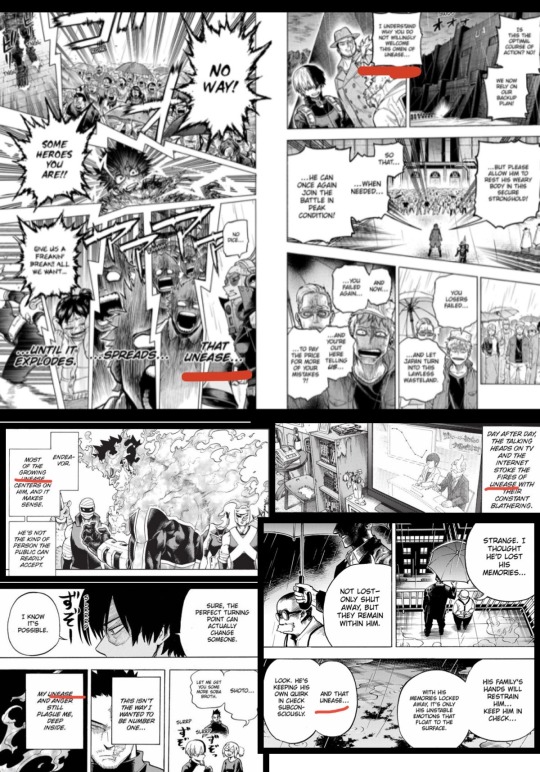
Unease spreading through the citizens feeds into AFO’s win conditions perfectly. He WANTS as many fractured and walled-off groups as possible. To steal OFA and rule for eternity, he needs to prevent a “singularity” of will that opposes him.
Let’s see what happens next chapter — I still don’t think Ochako has quite hit her “light of hope” moment yet, and am not convinced this speech will be it. I do think she’s trying hard to humanize Izuku as the OFA holder, but the irony is, in doing so, she is denying he is a special person to her. Only a few humans are truly special at the societal level, but we all have friends and loved ones that think we are special. That’s right, you are loved, even if you don’t have OFA. You are loved even when you need saving. I think this is what All Might was getting at when he tells Izuku during the Sports Festival that there is something special in Izuku. All Might is saying he feels a connection and a trust with Izuku because they were both born quirkless, which makes Izuku special to All Might. This contrasts with Endeavor and Jeany, who view Izuku as special solely because he is the OFA wielder, and Izuku’s need to rest is in service to that duty rather than Izuku’s needs as a human.

#mha#my hero academia#bnha#boku no hero academia#bnha spoilers#mha spoilers#bnha 323#mha 323#bnha meta#mha meta#long post#all might#izuku midoriya#ochako uraraka#principal nezu#rat principal#present mic#Jeany
93 notes
·
View notes
Note
I really like the snippets of the SVMs that you post, but I can’t help but think about how by the end of the series Charlaine Harris just decided to destroy the character of Eric. I read those last few novels and just fumed with anger. Were you happy with how they turned out?
You are absolutely correct, anon. Was I happy with how they turned out? Absolutely not. I have a lot of bones to pick with Charlaine Harris about what she did to Eric Northman, but more importantly, I have a lot of bones to pick with Sookie.
Initially, I thought that the problem in the latter books was that Harris got lazy with everyone's characterization when she was contracted to write three more novels and started writing these characters in ways that were inconsistent. Certainly, there are a few instances where Eric is portrayed in a manner inconsistent with earlier books. (He loses a lot of his humor and charm and suddenly has a very different perspective on the possibility of turning Sookie, which I attribute to bad writing.) But as I went back in the series to compile these quotes, I noticed that the problems I had with Sookie's character in the latter books manifested much earlier. I have been trying so desperately to wrap my head around her behavior, and I have come to the following conclusions about Book Sookie, which are not necessarily applicable to TV Sookie...
(major spoilers and an unedited 4,000 word essay ahead)
Sookie's mind-reading abilities have stunted her ability to read and empathize with others without the use of her powers.
The magical bond that is formed when she and Eric exchange blood circumvents this while it is active, enabling Sookie to feel Eric’s emotions rolling off him at the time. She knows he is terrified when his maker arrives in book 10, and she is even able to identify precisely why he is frightened: he doesn’t want to be under someone else’s control. But after she severs their bond in book 11, her ability to read him fails her. She has spent her entire life reading people’s minds, which has served as a crutch. Rather than developing the intuitive ability to read a person’s body language and read between the lines of what they are saying that most of us learn, Sookie relies on her abilities, which don’t work on vampires. As a result, their motives are often mysteries to her. She notes how stony-faced they are, how carefully controlled they are in expression, but she misses a lot of cues that convey their repressed feelings. This is particularly bad for Eric, who, like many men, shields himself with anger when he is feeling hurt. His anger is not excessive or violent—in fact it is often very well controlled—but it masks the tender feelings that hide under the surface. It is telling that Sookie never acknowledges the incredible pain and betrayal that Eric must feel when she severs their blood bond, or when she ultimately refuses to save him from being taken away from her. The only time she feels sympathy toward him in that respect is in one line at the very end of the series where she considers how lonely he will be—and then she purposefully smothers that thought, refusing to dwell on it further.
Sookie's trauma from her formative relationship with Bill renders her suspicious of the motives of others and unable to trust her future partners.
Bill is the first man she ever dated, fell in love with, or had sex with, and it is revealed to her through Eric’s intervention that their entire relationship was premised on a lie. This plot point is the same in the book as it is in the TV show. Once Sookie and Eric are together, there are numerous instances where she suspects his motives. She maintains the firm belief that Eric never does anything unless it would be beneficial to himself, which is probably true up to a point, but even after he has shown that he is deeply in love with her and that he has borne the personal cost of this love, she still doubts him. In fact, Sookie believes that the love they seemingly share is only the result of the magical blood bond between them, which renders it false. Eric repeatedly states that he does not care why he loves her, only that he does, but this is a problem that Sookie cannot get past. It results in her severing their bond without warning. Once the bond is severed, she insists that she does still love him “all on her own” but her love quickly begins to erode without the understanding that the bond created as they are besieged by numerous calamities. When the final obstacle to their love presents itself—a contract negotiated by Eric’s maker that would force him to marry the vampire Queen of Oklahoma against his will—Sookie is so blinded by her inability to trust him that she doubts every word he says about wanting to stay with her. He never expresses a desire to leave her for the queen, but remains stalwart in his insistence that he cannot escape the contract despite seeking every possible loophole. Yet Sookie believes he is attracted to the queen and the power that she possesses and attributes his insistence that he is trapped in the contract to a clever lie designed to dupe her. In the final days of their relationship, Eric reveals that he knows Sookie could save him with a magical object that grants her one wish, and repeatedly insists that she could stop him from being taken from her if she wanted to. He does not ask her to do it, nor does he mention the object explicitly, or ask where it is. His statements read like a man who is wounded by his lover’s unwillingness to save him, but one who perhaps has too much dignity to resort to begging her to intervene. Presumably he believes that he should not have to beg the woman who says she loves him to save him from “cushy slavery,” as Sookie calls it. Once Sookie realizes that Eric knows about her magical deus ex machina, she starts to wonder if he really just wants to take it from her, or use it for himself. She even entertains the possibility that maybe he orchestrated the entire dilemma in order to get his hands on it. When the thought enters her head, she admits that she never would have considered such a thing if it weren’t for Bill’s betrayal of her.
Sookie's affection for Eric is conditional upon his usefulness to her (including as a sexual object), and she never develops an appreciation or understanding for who he is as a person.
Perhaps this is the fatal flaw in their relationship from the very beginning. Sookie does not express an interest in Eric other than the fact that he is physically attractive until his numerous favors to her and the many instances where he has saved her life or protected her begin to add up. The blood bond between them is formed when he prevents a vampire who has authority over him from forcing blood on an unwilling Sookie, instead offering his own blood as a substitute. Their marriage was orchestrated by Eric when another vampire wanted to take Sookie away from her own against her will, and it allows Eric to serve as a barrier to any other vampire who would try to harm her. Once their romantic relationship is formed in earnest, it quickly becomes evident that it is lopsided. Eric praises Sookie for her beauty, but also for how brave she is and how hard she works and countless other virtues that are not physical in nature. In return, Sookie feels obligated to pay him a compliment, and all she can manage is that he has a nice body and is good in bed. She often deflects from serious conversations with him to have sex instead. Sookie clearly doesn’t believe Eric is a good person, expressing her own doubts about his moral code when he doesn’t display enough outward moral repugnance for her liking. When Eric tells her how his boss tortured and killed a human woman to punish a vampire, she asks him how the story made him feel. His answer—that it made him fearful it could happen to Sookie—is not good enough for her because he does not also express remorse for the woman in question. (It should be noted that he doesn’t revel in her pain either; he is merely concerned with applying the moral of the story to his own circumstances and the woman that he loves.) Sookie does not seem to acknowledge the good that other people attribute to Eric, such as when his new bartender tells her she requested to come work for him. Sookie cannot imagine why anyone would want to work for Eric, but the vampire explains that he is a good master to serve because he treats his people well, specifically pointing out that he doesn’t ask for sexual favors from his female subordinates like other sheriffs do. Sookie is not interested in his life, his business, or his world. When he attempts to explain the elaborate hierarchy of vampire politics to her in an effort to include her more in his affairs, she outwardly expresses so much disinterest that Eric takes offense. Their relationship treads water for a while, until Sookie is kidnapped and tortured by fairies and Eric is prevented from rescuing her. While she is being tortured, Sookie is certain that Eric will show up at any moment, but she doesn’t know that he has been forbidden from intervening by his boss. The other vampires bind Eric in silver chains to keep him from going to save her. He later tells her how anguished he was that he could feel her pain and do nothing to protect her, shedding tears as he talks about it, but she doesn’t want to hear it. That moment marks a turning point in their relationship. Sookie repeatedly affirms that she believes Eric is so big and strong and capable of handling anything, and any time he is not able to deliver on her expectations, she loses even more love for him.
Sookie's prejudice against vampires leads to her treating them as though they are not people.
Although Sookie does not express her prejudice explicitly as some characters do, she still exhibits a bias against vampires throughout the books and expresses a clear preference for humans or shapeshifters. She is disgusted, for example, by Eric’s suggestion that she should come work at Fangtasia, saying that she would hate to watch the fangbangers seek the attention of the undead among them. She believes that they do not feel emotions or possess empathy in any comparable measure to humans. (The thought that not all humans share the same depth of emotion or empathy does not seem to occur to her.) She also discounts their physical pain or suffering because they possess the ability to heal themselves. This happens numerous times when Eric is wounded, often while trying to protect her. In one case, Eric shoves himself in front of a car window and takes a bullet intended for her point blank. While he is injured, he fights off the werewolf who was trying to kill Sookie. Then he gets back in the car and drives her home with the bullet still lodged inside his chest. When they arrive back at her house, he asks her for blood, saying explicitly that he is in pain as his body pushes the bullet out of his chest. She tells him he’ll be fine and if he really needs it, he should stop at Merlotte’s and get some True Blood on his way home. Another time, Sookie comes upon Eric after he has been badly beaten and bound with silver. His arm is broken and his hands, she notes, look gruesome, because the silver was wrapped around them. As soon as she frees him, he springs into action and decapitates the vampire who had attacked him before said vampire can go for Sookie, who gets faint at the sight. (She is not injured.) Eric picks her up even though his arm is broken, and she takes the opportunity to internally romanticize the moment, imagining that she is Scarlet O’Hara. But a short while later, she asks Sam to drive her home without thinking about offering Eric a bottle of True Blood even though they’re right in front of the bar. The most egregious example of this phenomenon occurs when Eric’s vampire brother has massacred all of the staff at his home. Sookie arrives to find several vampires and humans slaughtered on the premises while Eric is desolate and in excruciating pain with his ribs ripped through his chest. He tells her that he needs her to push his ribs back into place and that Pam was there as well, and Sookie proceeds to chastise him for not springing into action to go after his brother. When tears form in his eyes, she grows impatient and questions why he hasn’t called someone to come clean up yet. It isn’t until midway through the conversation that she tells Jason to push Eric’s ribs in so he can heal, and it is only on accident that Jason happens to find Pam, who is thankfully not dead.
Sookie's system of morals is so rigid that, when she participates in violence, she suppresses her own personal responsibility and projects blame on the people around her in order to continue believing that she is a good person.
After the massacre referenced in the paragraph above, Eric and Sookie must fight his crazed brother and several fairies at her house, slaying his maker in the process. When they are victorious, Sookie is immediately revolted by the bloodshed. Eric, meanwhile, is flooded with relief that he is free of his maker, who subjected him to hundreds of years of rape and slavery when he was first turned into a vampire. Sookie knows this, and in fact can feel the emotions radiating from him, but she seems to despise Eric for feeling anything but repugnance in that moment. This appears to be her coping strategy any time she participates in violence—she negates her own culpability and creates moral distance between herself and Eric by judging his reaction to be grotesque. The same thing happens when they are able to kill the brutally cruel vampire regent who was actively trying to ruin Eric and was responsible for attempts on Sookie’s life and who refused permission for Pam to turn her human lover into a vampire before she died. Eric and Pam are joyous that they have won and that the regent cannot torment them any longer. Sookie, who helped plan the attack and in fact dealt part of the killing blow to the regent, is abruptly disgusted when Eric embraces her and kisses her. It does not occur to her that he might be relieved that she was unharmed in the battle and that the constant threat to them all has been eliminated. Instead, she assumes that he’s trying to have sex with her and tells him she’s not interested in a manner that clearly conveys her revulsion. Eric does not handle the conflict gracefully, and bites her harshly to drink from her after he tells her she’s being a hypocrite, which only gives her more reason to push her guilt away and project it onto him.
Sookie’s youth and inexperience serves as a barrier to navigating the turbulent waters of a real relationship.
Sookie had never been in a relationship before Bill, and she only has one other relationship between breaking up with Bill and getting together with Eric. While she enjoys the ‘honeymoon’ phase of her relationships, she flounders when it comes time to address communication issues or outside pressures. Neither Sookie nor Eric find it easy to establish an open channel of communication, but Sookie actively seeks to end serious conversations early or avoid them altogether, while being stunned that Eric initiates conversations about their relationship, something that she thinks all men avoid. At one point, she tells Eric that they need to talk and then starts discussing what she refers to as their “irreconcilable differences.” The conversation seems to be veering into breakup territory, and they’re deeply involved in it when someone knocks on her door. She immediately invites her unexpected guests in and is relieved by the excuse to terminate the conversation abruptly even though Eric is still trying to figure out what’s going on. At other times, she observes that she loves Eric, but she’s not feeling the same lust or excitement when she thinks about him anymore. Anyone who has ever been in a long-term relationship knows that passions often wax and wane, and that it also takes work to sustain and strengthen a relationship over time. Sookie is unwilling to put in the work or even have an honest discussion about the things they need to work on. She talks about romance novels a lot, and it seems to me that she has an idealized concept of love where she believes that they should be effortless and that passions should always be as hot as they were at the beginning. There are also times when she behaves in an extremely childish manner in the midst of conflict. After she severs the magical bond between her and Eric, he comes to her house and her main concern is whether or not he’s mad, while he asks her if she still loves him. She stubbornly insists he has to answer her question first even though she’s the one who broke the bond. On another occasion, Eric’s king comes into town and he is required to be at the monarch’s beck and call. Sookie gets mad at him and tells him she doesn’t want to see him one day, then is even more irritated that he isn’t calling her the next. Soon after, Eric is dealing with an endless litany of personal disasters that he can’t control, and he is short with her. Sookie listens to him confide in her about his problems and then responds with sharp-edged, sarcastic contempt, telling him that she has information that might have helped him with his problems and she might have told him if he wasn’t neglecting her.
Sookie’s limited understand of cultures that are unlike her own leads to misguided assumptions and fatal misunderstandings.
As the books progress, Sookie’s knowledge about vampire culture and governance grows incrementally, but she never approaches their customs with the same open-mindedness that she uses when it comes to werewolves or shapeshifters and their customs. This proves to be a major problem in her relationship with Eric, where there are two unfamiliar cultures at play—the modern culture of vampires, and the ancient culture of Eric’s human life. Sookie often refers to Eric as her “big Viking,” but she never gleans any insight about the culture in which he was raised. She seems to believe that he does not have much respect for women and projects American pre-Women's liberation attitudes on him even though he does not express those beliefs. When he offers to have her come live with him, she assumes that he wants her to be a housewife who cooks and cleans for him. She takes offense, and Eric is confused by her response. As Sookie’s situation becomes more perilous and she is injured multiple times in attacks at Merlotte’s, Eric asks her repeatedly to come live with him and/or work at Fangtasia so that he can protect her. She rebuffs these proposals, believing that they are rooted in misogyny. Sookie is also disinterested in understanding vampire culture, tuning Eric out when he explains things to her and refusing to accept that their rules and customs are different from her own when they inconvenience her. In particular, she never seems to understand the feudal system of governance under which the vampires live. When Eric is obliged to obey his maker or wait on his king or queen, Sookie is consistently irritated that he is not paying enough attention to her. She either does not understand or will not accept that vampires are not free to do whatever they want. This becomes a huge problem in the latter three books after a king from another state annexes Louisiana and kills every sheriff except Eric, putting him in a precarious position. Backed into a corner, he must maneuver very carefully to protect himself and everyone who is loyal to him. At the same time, he learns that his maker entered into a contract to marry him to the vampire Queen of Oklahoma against his will. Sookie refuses to believe Eric when he tells her that there is no way out of the contract, repeatedly insisting that if he loved her enough, he would just refuse to honor it. She holds him to the standards of her own culture, remaining willfully ignorant of the horrible consequences that could befall them both if Eric were to disobey. When she learns she can intervene and save Eric from his fate, she refuses, adamant in her belief that he will find his own escape clause if he truly wants to. The end result of her refusal is that Eric is forced into 200 years of “cushy slavery,” as Sookie calls it, a fate that does not inspire any guilt or pity in her, presumably because she still sees herself as a jilted lover.
At the end of the day, Eric deserved a lot better than Sookie.
He also deserved a lot better from the author, and a lot of people were justifiably outraged with the ending that Charlaine Harris gave to him. Harris, by way of Sookie, repeatedly reminds the reader that the Queen of Oklahoma is a very attractive woman, and it seems that this is intended to excuse the fact that Eric would be contractually obligated to have sex with her whether he wanted to or not. Eric expresses no desire for the queen, constantly asserting his commitment to and love for Sookie. When he admits that he would be required to consummate the relationship with the queen, he seems discomforted and ashamed at the idea. (Harris specifically uses the word “abashed.”) It is revealed to Sookie that the queen conspired to put Eric in this predicament specifically because she knew he valued his independence too much to ever agree to it willingly. Sookie knows that Eric was forced to service his maker sexually against his will, and that what he hates above all else is to be subjugated. She also knows that he will not be a monarch if he marries the queen; he will be her consort, a position that carries with it no inherent power or authority unless the queen gives it to him, and he will not be able to ever succeed her. Even despite all of this, Sookie is completely unsympathetic toward Eric. The author never acknowledges that this ending for Eric essentially means that he will be raped. What astounds me is that I don’t think she would have made his choice for a female character, or if she did, she would not have framed it in the same way. Sookie’s casual dismissal of Eric being sold into “cushy slavery” implies that male rape is no big deal, which is incredibly harmful. It is astounding that she would subject the primary love interest of the entire series to such a fate, and it’s the final nail in the coffin for Sookie Stackhouse for me, at least in her book incarnation. If any of her other love interests had been put in similar circumstances, I can’t imagine what she would not do to try to save them. But because it was Eric—her big, strong Viking who she believes is incapable of feeling emotions or pain and must be invincible in order to be valued by her—Sookie thinks nothing of it. Nothing at all.
@grimeundglow @stevesharrlngtons @scxrsgxrd @grandpa-sweaters
#I have been waiting to say all of this for weeks#thank you for putting up with my quote spam#TV Sookie is fine#TV Sookie can be with Eric if she wants#Eric Northman#Southern Vampire Mysteries#Southern Vampire Mysteries Spoilers#English Major Rants#The Longest Rant She Ever Ranted
38 notes
·
View notes
Note
I'd like to preface this by saying that I love your blog and all the analysis that you've done on various characters, scenes and ships. You are one of my online heroes. I'm not sure if you're still doing the ship asks, but if you are, what are your thoughts on frelin?
Dude tysm! I’m not sure ‘online hero’ is a great way to describe someone who once made a post comparing dragonlords to furries, but I’ll take the compliment nonetheless!! Your kind words have given me enough dopamine to last until my next paycheck <3
Freylin is a decent ship - conceptually. They're two kindred spirits who found solace and intimacy with each other, drawn together by their mutual sense of otherness (possessing magic). However, I think Freylin does fall into some obvious trappings of Insta-Love, Heteronormativity, and Not Giving Female Love Interests Any Discernible Personality Traits.
For some people, that's not a problem. They like watching Merlin and Freya be cute and sappy with each other, and I'll agree that it was a treat to see such a fun side of Merlin. If that's the kinda ship you like, then great! Ship away. But personally, Freylin makes me feel bad for Freya.
Not because of the death thing - lord knows I've done far worse to beloved characters without even a hint of remorse. But I feel bad for her because of her role in the ship. As mentioned above, her main purpose in the narrative and in Merlin's life is to give him some angst, then come back later in season 3 to give him some helpful advice as a sort of Freya Ex Machina. Her personality has no depth beyond what was necessary for the story. And even in fanon interpretations of her, she's essentially just a more shy/introverted carbon-copy of Gwen.
And, okay, as a writer I can admit that there are some characters who don't need a lot of depth. Some characters are plot devices, and that's okay. Freya only appears in like two episodes, so under normal circumstances I'd begrudge that level of shallow characterization. But the rules are different for characters who have a close emotional connection with the MC, especially love interests - even episodic dalliances like Freya!
Take Balinor, Will, and Daegal, for example. They were all important to Merlin, and all had distinct personalities. Balinor is cantankerous and reclusive. Will is pragmatic and confrontational. Daegal is earnest and youthfully naive. And we as the audience liked them too, because they felt like actual people, even though their main purpose in the story is mainly to serve Merlin's arc. They are, fundamentally, plot devices, but they don’t feel like plot devices because of how organically they’ve been written.
Freya is a harder sell, because she doesn't have as much of a personality with which to endear us. I'm not saying we need to know Freya's favourite colour and her fondest childhood memory, nor do we need to witness her go through a seasons-long character arc. Not every background character needs their personality painstakingly detailed, least of all background characters. If well-written main characters are chicago deep-dish pizzas, then well-written background characters are hot pockets - easy to make, easy to love, easy to remember. Characters like Gilli and Elena and the love of my life Sophia are good hot pockets. But Freya as she currently is, she's not even that. She's like if we were told there was a hot pocket in the microwave, only to open it up and find it's just a lump of half-melted cheese.
And it's sad, because Freya had the potential to be interesting. She could've had a distinct personality that made us fall in love with her right alongside Merlin - which would have made her death even more painful for both the characters and the audience alike. But even if you don't give her a personality, at the very least let her fulfill her purpose of furthering Merlin's character arc instead of just making him sad for a few minutes.
While I'm by no means an expert writer, here's how I would've taken a crack at having Freya’s impact on Merlin's arc.
So Merlin sees Freya again, but she's not some helpful water spirit. She's emotional and volatile and vengeful and deeply, profoundly traumatized by the nature of her death. And maybe it's his job to finally lay her soul to rest once and for all.
She gets upset at Merlin. She cries and shouts and weeps about her death, about the pain and injustice of it. How could he continue protecting her killer? How could he befriend the man who literally murdered her? Freya didn't want to die, she didn't want to be a monster, she didn't want to be alone (cue implications that she has been trapped inside the lake all this time, maddened by isolation). She just wanted to be left in peace. To be loved. Merlin naturally defends Arthur, saying that he is destined to be a good king, destined to free magic and bring about the golden age of Albion. But she insists that destiny must be wrong, because what has Arthur done for the magic community besides perpetuate his father's company line? He killed her, killed several others like her, and even to this day he condones the oppression of their people - what makes him think a man like that could ever change, could ever set them free? And even if he does, why should any of them be expected to forgive him for his war crimes?
She tells him that deep down, Merlin knows this. Deep down, Merlin fears Arthur just as much as the rest of them. If he truly believed in Arthur's inherent goodness, in his destiny, then Merlin would not have kept his magic hidden for so long.
Thus sparks a seed of doubt in Merlin's mind, and scenes like Morgana's speech in Tears Of Uther Pendragon Part 2, Arthur's drive to destroy the dragon egg in Aithusa, Kara's execution in Drawing in the Dark, and the confession in Herald of a New Age would only cause that seed to grow.
Not only is this a natural and logical progression of his character, but it would also be compelling to see Merlin's unwavering loyalty to Arthur do exactly that - waver. It grants depth to his character, empathizes us to his cause and the cause of his people, and lets us see Merlin in a unique perspective. It also puts a new light on Arthur's actions, foreshadowing an eventual moment of reckoning where Arthur will have to face the consequences of his harmful rhetoric - thereby creating a subtle layer of tension as we wait for that moment to finally arrive. And there's yet another layer of tension that arises from Merlin's repressed yet growing doubts: will he finally admit that Arthur isn't the shining saviour Kilgharrah had promised he'd be? Will he snap like Freya did? Will he and Arthur drift apart? And if they do, what will bring them back together, if such a thing is even possible? How will they make amends? How will Arthur learn from his mistakes and earn back Merlin’s trust?
I could go on and on about how this would impact the story as a whole, but I'm not here to talk about my rewrite ideas. I'm here to talk about Freylin.
At the end of the day, while it's a good ship, Freya doesn't have much personality, which affects their overall chemistry, and I don't think they have enough going on between them to be an endgame pairing. My personal opinion is that Freya has less narrative potential as a romantic partner, and more narrative potential as a supplementary background character whose closeness to Merlin combined with her own trauma forces him to develop and grow in certain ways. She's less of a Gwen (long-standing love interest), and more of a Balinor (one-off character with emotional importance), and that's perfectly fine. But because of her lack of personality and overall narrative relevance, I have a hard time believing or shipping Freylin beyond the scope of her debut episode.
Thanks for the ask! <3
66 notes
·
View notes
Text
What happened to Sherlock? Part VII – The Importance of Being Earnest (1)
This is the seventh instalment of my meta series, where I’ll take a closer look at the two last episodes of the show this far. As you know if you’ve read the earlier parts, a premise for this analysis is that we’re seeing the entire show from Sherlock’s perspective; we’re literally inside the great detective’s head since Day 1, and he’s working inside his Mind Theatre where he reconstructs scenarios with different ‘actors’ representing different concepts and problems he needs to delve into, very much following his usual MO of crime solving. By now I also part from the assumption that from at least HLV and onwards Sherlock is trapped inside his own mind (EMP theory), possibly in some kind of comatose state, and in ‘real life’ the detective is hospitalized and close to dying. These conclusions are based on the different hypotheses I’ve already tested in the earlier installments of this meta series, which you can find below:
Introduction - The game is on (explains the method of analysis)
Part I - Blog vs TV-show
Part II - Re-living memories
Part III - Drugs and weirdness
Part IV – Heartbreak and coma (1)
Part IV – Heartbreak and coma (2)
Part V – Bizarre scenarios
Part VI - Live and let die (1)
Part VI - Live and let die (2)
The hypothesis to test this time is about Sherlock’s inner development:
Hypothesis #7. By TFP Sherlock has managed to figure out some essential things about John and the importance of staying alive, and he has managed to get in touch with his own repressed emotions.
I think this show – especially from HLV and onwards - might represent an important inner journey for Sherlock, where he tries to find out what went wrong between him and John and what could be done to fix it. On his introspective journey, he gets to learn a lot about John, but also about himself and how he comes across in John’s eyes. To test this train of thought, I’ll re-visit TLD, TFP, and some scenes from TST, to see what this might mean in terms of Sherlock’s Mind Theatre Simulations. But first of all, I’d like to present a background idea:
The Therapist
Judging by the total number of scenes with therapists this far, they seem to play an important role in BBC Sherlock. But which role exactly? And are the therapists we see even real? After TLD I think it’s justifiable to question this. At the end of TST we see Sherlock visiting John’s therapist Ella Thompson:

According to John’s blog - which I believe we can use as a sort of anchor to the show’s ’reality’ (see my Hypothesis #1) – John has indeed been in contact with someone named Ella Thompson, who I think we can safely assume is his therapist, judging by the circumstances in which John mentions her. Her name appears in one of the very first blogposts:

And then Ella herself comments on another post:
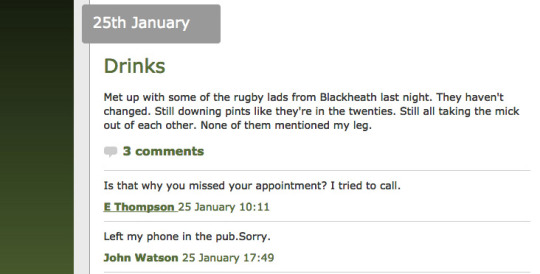
And then she is mentioned again when John has just met Sherlock:

She also begs him to “please answer your phone”, after the post called “My New Flatmate”, where we can find John’s first account of the events related to ASiP. As for the TV-show, Ella appears in person in the beginning of it, in ASiP:

In the taxi heading for Brixton in ASiP, Sherlock tells John that he deduced John must have had a therapist: (all quotes below are based on the incredibly useful transcripts by Ariane DeVere - my bolding):
JOHN: You said I had a therapist.
SHERLOCK: You’ve got a psychosomatic limp – of course you’ve got a therapist.
Mycroft’s attitude towards Ella’s competence is a bit arrogant. Apparently she didn’t realize that war trauma isn’t the real cause of John’s trembling left hand:
MYCROFT: You have an intermittent tremor in your left hand.

She thinks you’re haunted by memories of your military service.

JOHN: Who the hell are you?
Yes; how could Mycroft know this? Therapists are usually bound by strict confidentiality, and civil servants asking questions about clients’ health issues are no exception. Did he threaten Ella? Or steal the document? Sherlock’s brother isn’t even mentioned on John’s blog until ASiB, and in the show John never mentions Mycroft’s theories to Sherlock. If Mycroft represents Sherlock’s brain here (as some of us believe), and the kidnapping scene only occurs inside his head, then this is rather Sherlock’s personal conclusion.
MYCROFT: She’s got it the wrong way round. You’re under stress right now and your hand is perfectly steady. You’re not haunted by the war, Doctor Watson ... you miss it.
After this, nothing more is said about Ella for a long while. Until she seems to start communicating via John’s blog again after Sherlock’s ‘death’, when John publishes a blogpost titled “A New Beginning”:

I don’t think it’s farfetched to assume that Ella has tried to persuade John to keep up the blogging. Later, in the comment section of the blogpost “Death by Twitter”, Ella also interacts with the username “theimprobableone”. The impression I get is that Ella is kind, reaching out to someone who isn’t her client (even if this would actually just happen to be Moriarty :))) She might also be very competent, but the therapy won’t work unless the client actually collaborates.
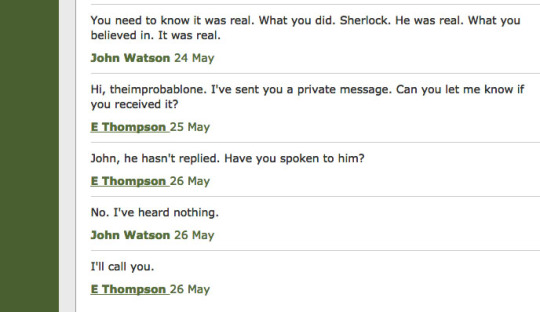
But in the TV-show we see a new therapy session in TRF, apparently 18 months after their last one, where John seems unable to tell Ella what actually happened to Sherlock, and why this has affected him so deeply.

Perhaps this scene is most of all Sherlock’s conclusion after observing on the blog that John was now back to Square 1 in his therapy with Ella? Which means he was back to ‘blogging-will-help’.
I’m gonna part from the assumption (according to my hypotheses #1 and #2) that the first two and a half series of this show represent Sherlock re-visiting his memories while reading John’s blog. He might be influenced by drugs while doing this, and he might ‘pimp up’ these memories by fantasizing about events he deduces must have happened, but where he wasn’t personally present. So he tries to mentally reconstruct what might have been said in these scenes. Since Sherlock isn’t present in the scenes with Ella described above, I think they might be fine examples of such ‘deductive fantasies’, basically constructed from reading John’s blog. (Regularly this is also an important part of Sherlock’s methods for crime solving by deductive reasoning inside his Mind Palace).
But in S4, at the end of TST, we see Sherlock himself visit Ella, although in a setting that reminds me more of a cathedral than a visits room for a therapist. The whole scene seems extremely ‘staged’, like a theatre piece.

And when Ella tells Sherlock he has to open up completely for her to be able to help him, we learn two things:
Sherlock states that this is really not his style. In other words: he’s not ready for it, and
Sherlock thinks his main problem concerns John rather than himself. He believes what he really needs is to find out “what to do about John”.
Which might mean, in my opinion, that Sherlock now believes that ‘Ella’ won’t be able to actually help either of them. Conclusion, in Sherlock’s view: John needs a new, different therapist. And who has shown to actually be effective in curing John’s ailments - his earlier psychosomatic limp and trembling hands? Sherlock has. So, to continue testing this meta series’ earlier hypothesis (#5) about Sherlock running mind scenarios, and at the same time begin to test hypothesis #7, I’ll make the following prediction:
Prediction #1: If Hypothesis #7 is true, TLD could serve as an ‘appointment’ where Sherlock is John’s therapist trying to figure out ‘what to do about John’.
One interesting thing with TLD is that it both starts and ends with John visiting his new therapist. But in the end it turns out that this ‘therapist’ is actually Eurus, a ruthless killer who has disguised herself as a therapist (while the real therapist appears to be ‘closeted’ in a horrendous way). But I don’t think Eurus is ‘real’; she’s rather an aspect of Sherlock himself.
Sherlock might also assume that if he can’t protect John and John’s loved ones, he has failed John (hence his extreme sense of guilt and self-loathing after TST). But if Eurus isn’t even ‘real’, in which ways has Sherlock really failed to protect John? I think the real issues are:
He can’t protect John from being 'outed’ in media, who will speculate about his sexual orientation (the problem of TRF), which John has shown signs of fearing. Being associated with famous ‘weirdo’ Sherlock Holmes is ‘bad for John’ because he’ll drag John into media exposure.
By TLD, Sherlock has reached a mental stage where he cannot help John keep up his heteronormative façade any longer; thus ‘Mary’ will have to go, to disappear, which Sherlock believes will destroy John.
Below follows a series of possible ‘what-if’ scenarios, which Sherlock might be running inside his mind in TLD (and this is of course mostly my speculation). They are following the same pattern I used to test Hypothesis #5: 1. Detect possible initial questions, 2. Investigate possible elements of inspiration from movies and/or Sherlock’s own memories and 3. Explain possible results in the show from each of Sherlock’s mind experiments. Plus discussions about evidence that indicate this is indeed a MP scenario. But this time the scenarios are also ‘therapeutic’; this is where Sherlock tries to look closer at John and their relationship, taking over from Ella the job as John’s therapist.
TLD, Scenario 1: What will happen when John visits a new therapist?
Inspiration: We don’t know if Sherlock has experiences in this field, but since he’s addicted to drugs it’s not unlikely that he has some knowledge of therapy from rehab. In this scenario I think Sherlock takes the role of therapist himself.
In Part 6 of his Follow-the-dogs meta @sagestreet makes a good case for Ella being a Sherlock mirror (My bolding). ‘Thompson’ refers to a character mentioned on Sherlock’s website. (Does anyone know, by the way, what happened to that website? It has been down for months by now!):
“And need I tell you that ThompSON could be a nice mirror for WatSON? (Let’s not even go into the whole fact that this could be Ella Thompson’s husband, which would make Ella a Sherlock!mirror of the first order. I mean, Ella has been a slightly distorted Sherlock!mirror right from the start, what with telling John, in TRF, he should articulate his feelings for Sherlock after Sherlock jumped…

...just to give you one example.)”
[running, running the TLD simulation, staged with ‘actors’ that either represent John or Sherlock or the challenges they are up against…]
Result: John appears to be in deep mourning; he tells the therapist that he has sleeping problems and ‘can’t always cope’. He also gives away something about his alcohol problems and loneliness; he has no one to confide in. He expresses his guilt and bitterness for not taking care of his child. But he won’t tell his therapist about how he keeps seeing his departed spouse as a ghost:
MARY (offscreen): Are you gonna tell her about me?
JOHN (shaking his head): No.
MARY (offscreen): Why not?
JOHN: ’Cause I can’t.
MARY (offscreen): Why not?
JOHN: Because I can’t ... you know I can’t. She thinks you’re dead.

And neither will John confess anything about his feelings regarding either Sherlock or his (now departed) wife. By the way, don’t you feel the scene with the new therapist in TLD is a tiny bit familiar? I at least see certain similarities with this situation from TRF:
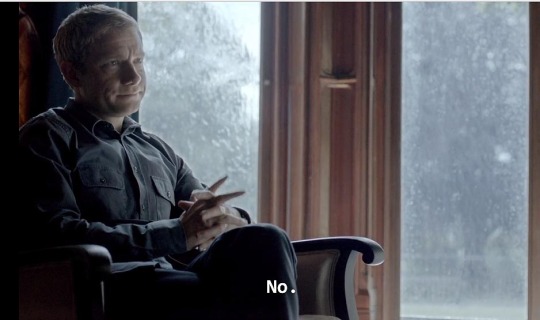
This was John mourning Sherlock, and now we see exactly the same thing regarding ‘Mary’? Still in TLD, John is unable to put into words any sort of feelings towards the people closest to him.
Then they start to talk about Sherlock, whom the therapist’s behaviour reminds John of (could the show be any more obvious than this? :-o). But John claims that he’s not thinking of Sherlock at all, and that their separation is Sherlock’s own fault for locking himself away in his flat; Sherlock hasn’t even attempted to make contact (hiatus after TRF, anyone?). Then the session is interrupted when a sports car stops with squealing tyres outside the house.
Discussion: This is supposedly about ‘Mary’s death and John’s neglect of his daughter Rosie, plus Sherlock’s despicable conduct. But I think what we actually see here is Sherlock’s deeper exploration of how John must have felt when he believed Sherlock was dead after ‘the fall’ in TRF. Sherlock needs other ‘characters’ in his Mind Theatre, because he’s still unable to face the fact that it was he, Sherlock, who caused John this level of grief by leaving him. And neither can he fathom the reason for this deep grief. Which might indeed be difficult for Sherlock to comprehend, because why then would John marry someone else when Sherlock got back? John doesn’t open himself up here. But I do think Sherlock subconsciously learns that John might have felt guilty after Sherlock’s ‘suicide’, maybe for having called him a ‘machine’ or other negative things, maybe for drawing media’s attention to Sherlock in the first place, unable to protect him against the slander. Maybe for failing to take care of his friend. All since Sherlock’s comment in TSoT about having been a ‘child’ for John and Mary to look after, I imagine John’s supposed guilt regarding Rosie could just as well be about Sherlock (”everything is about Sherlock”).
TLD, Scenario 2: What will happen if Sherlock tries to make John confess his feelings for Sherlock?
Inspiration: This seems to be almost entirely based on Sherlock’s own memories. I think he is drawing from his vast experience of criminals and drugs. In ASiP there’s a serial killer who convinces his victims to commit suicide with a drug. But we’re also presented a serial adulterer in the same episode; the murder victim Jennifer Wilson. In TSoT we have the Mayfly Man, a serial ‘dater’ who is also a killer, and whose behaviour is reminiscent of John’s. This is, I believe, a long, charged and complex scenario stretching out along the whole episode of TLD. And it’s largely based on metaphors, hence the word play where ‘serial killer’ is substituted with the harmless ‘cereal killer’. As many have said by now: If murder is a metaphor for falling in love, confessing to it is a confession of love. And I believe we have a lot to go on in this show…

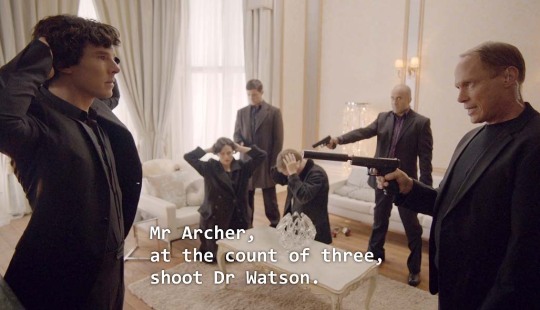
[running, running a scenario, where Culverton Smith represents an aspect of John, but where John also represents himself]
Result: A ‘serial killer’ (Smith, representing John) wants to confess to his ‘crimes’, but at the same time he is very contradictory about it, because he doesn’t want to take the consequences of confessing. So TD12 - a memory-altering drug (the effect of which is similar to alcohol) - is the solution; Smith/John can back-pedal and pretend the confession was never made.


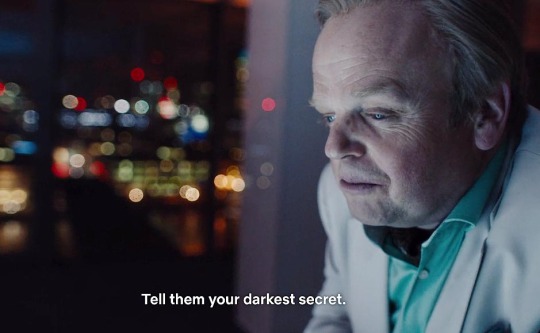
Sherlock doesn’t have evidence, but tries to make the ‘serial killer’ confess openly by playing along with him and then confront him. But it doesn’t work; John just beats Sherlock down and leaves him - again. But later Sherlock manages to collect evidence by tricking the ‘serial killer’ to act when Sherlock is at his most vulnerable, which provokes John to save him. In this episode, we’re lead to believe that Culverton eventually, after Sherlock’s ‘entrapment’, confessed to being a serial killer and was taken into custody. But the thing is, we never see Culverton actually confess to any specific crime – not even to the police. What he says to Sherlock’s face is merely that “killing human beings” makes him “incredibly happy” and that he “likes to make people into things”. But this wouldn’t hold in court for a murder case, would it? Who, in particular, did he actually kill? What exactly is Culverton accused of?

Sadly, there’s no open love confession from John – or John’s mirror - resulting from this scenario. But at least Sherlock manages to take on a new approach; he delivers two physical hugs to MP!John – one to ‘John the cereal killer’, and one to a guilt-ridden, repentant John at the end. The apparent topic of discussion is always something else than Sherlock’s and John’s feelings for each other, but at least we’re told that the ‘serial killer’ now can’t stop confessing ‘off-screen’. In the end of the scenario, though, Sherlock insists on wearing the deerstalker, which he has always disliked.
Discussion: I think maybe the most important result of this experiment is that Sherlock will never get a love confession out of John by sacrificing his life, no matter what ‘Mary’ (= heteronormativity) tells him to do. Actually, I believe the modeling shows that it’s Sherlock who needs to take the first step and actually tell John how he truly feels about him. The hug at the end of the scenario - at Sherlock’s initiative - makes this evident.

But I think this scenario does hint that Sherlock is finally heading in the right direction, even if he’s definitely not ‘there’ yet (the latter is indicated by the fact that he puts on the deer stalker, thus succumbing to keep hiding who he really is). The internal conflict in both Sherlock’s and John’s minds becomes blatantly obvious in this scenario; homophobia and heteronormativity are basically the most powerful obstacles that stand in the way for their relationship to develop.
I think Sherlock is dealing with a heavy onslaught of emotions; partly because reaching a point of honesty about his and John’s relationship is still a bit of a long-term goal, and partly because the journey there is booby-trapped with difficult topics like jealousy and guilt. We hear a lot about the atrocious ‘serial killer’ in this episode (Sherlock still doesn’t approve of ‘love’?), but we never get to see any of his supposed victims or any kind of incriminating evidence for Culverton’s supposed crimes. Except for his attempt on Sherlock’s life, which Sherlock admits is actually a kind of entrapment, set up by Sherlock himself.
TLD, Scenario 3: What’s the role of faith in Sherlock’s and John’s relationship?
Inspiration: There are many re-cycled elements in this scenario, which speaks for it being based mainly upon Sherlock’s memories. I made a list of the repetitions in a meta some time ago (scroll down to TLD). Walking the streets of London with Faith, for example, is a bit like running these streets with John in ASiP. Faith’s cane and limping is even directly compared to John’s in ASiP.
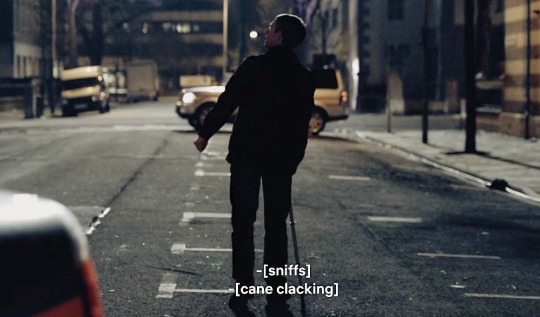
And her gun is thrown in the Thames, just like John’s was in the Pilot.
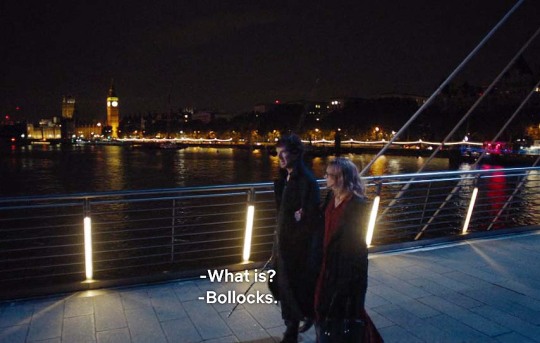
Look how Sherlock has taken over John’s Faith’s cane, and is supporting her.
[running a scenario, where I believe Culverton Smith’s daughter Faith represents what could have existed between Sherlock and John]
Result: Faith – here impersonated by (supposedly) Culverton Smith’s adult daughter - is strong and fragile at the same time. She manages to resist her drug-induced amnesia (‘wilful ignorance’?) of what Culverton is up to by writing a note, and she puts Sherlock on her case. But Sherlock also discovers that Faith is suicidal (directly compared to John in ASiP), so he tries to help her by keeping her company and throws away her weapon. But we see the same gun firing here, as in the beginning and end of this episode:

However, while contemplating his own possible suicide, Sherlock gets stuck in his childhood memories.
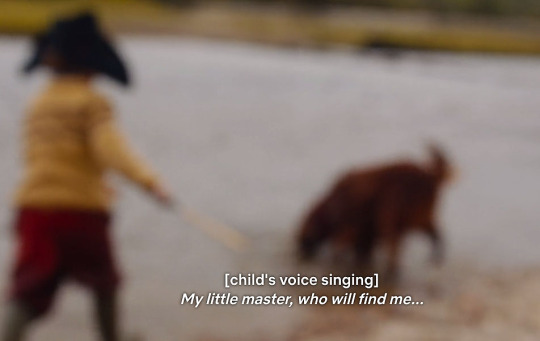
And mixed up with this, we’re exposed to subliminal flashes of a syringe and a spoon, possibly with dissolved heroine:

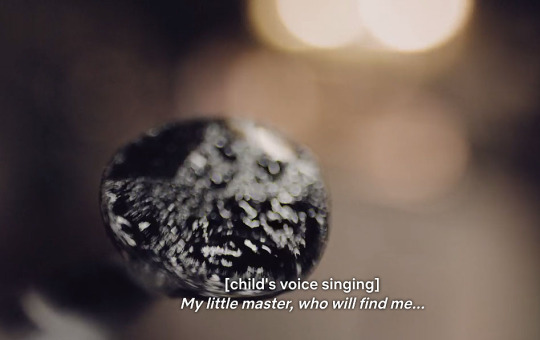
Discussion: As far as I can see, that’s Sherlock’s kitchen in the background. I wonder: did someone in Sherlock’s past kill themselves? Did one of his parents? Did this make him turn to drugs? It’s particularly interesting that the moment Sherlock approaches his childhood memory is exactly when Faith disappears; he ‘loses faith’. This might say something about how traumatic his memory is. But if this version of Faith is Eurus, and Eurus is a part of Sherlock himself, then this also means that he finds her again in TFP, doesn’t it?
A likely (in my opinion) significance of this losing Faith scenario has been presented by @sagestreet in a very interesting addition to one of my earlier metas (X); “Sherlock (in his own mind) is telling himself here that what he thought helped John as they met (curing his limp, becoming his friend, giving him laughter, warmth and friendship) never, in fact, existed!”
I also think it’s noteworthy that Sherlock now has ‘Faith’ for a client, the same way he had ‘Love’ (=Lady Smallwood) for a client in HLV (and ‘Hope’ as an opponent in ASiP, for that matter). Unfortunately, the result is only slightly better than with Love; this time Sherlock at least believes he has solved the case, but the real Faith turned out to not have actually been acquainted with Sherlock.
TLD, Scenario 4: What will John do if Sherlock ruins himself with drugs?
Inspiration: This scenario also seems based on Sherlock’s memories from his life with John; the list of repetitions can be used here as well. Like Sherlock waving a gun and shooting the wall (TGG), trying to convince John that he can predict the future (ASiP), John punching Sherlock in the face (ASiB, TEH), etc.
[Running, running a scenario where Sherlock is isolating himself and destroying his own brain and body with drugs inside 221B]
Result: Well, this rather dystopic scenario – paradoxically – might in a sense be pretty close to Sherlock’s own reality, because this is what I believe he actually did in John’s absence (directly after the wedding). Here we meet a Sherlock who has turned 221B into a meth lab, who is hallucinating gravely and who frightens Mrs Hudson with his dangerous tantrums.

(On a meta level, I think Sherlock’s Shakespeare quotations might be a ‘call to arms’ directed at the audience; how much more heteronormative crap are the viewers going to endure before the bulk of us start to protest loudly?)
But after Sherlock at least manages to save his cup of tea (quite the obvious metaphor here), Mrs Hudson finally takes charge. Sherlock is then ‘delivered’ to John in a fast sports car and a pair of kinky hand-cuffs (insider joke: the car is an Aston Martin). And the premises is now once again John’s new therapist’s house; in a way, the session continues.

But we also meet a John who is even more disapproving of Sherlock than in TAB, but this time he seems to care very little about Sherlock’s drug use or health in general. John says nothing about Sherlock visiting a children’s hospital while being high, and he doesn’t care when Molly claims that Sherlock is dying from the drugs. John actually encourages Sherlock to take more drugs:

Discussion: To me this plot line isn’t even remotely realistic; ‘real’ John would simply not treat his friend this way. He mourned him for two years, why would John not care about Sherlock dying now? But if this is rather Sherlock beating himself up in his Mind Palace, his bias and self-loathing could totally produce this result. And apparently this tactic, no matter how elaborate, is useless; Sherlock ruining himself on drugs will never lead to any change in their relationship – John will not even acknowledge his ‘cry for help’. Sherlock has been dishonest to John so many times that John no longer trusts him when he tries to be honest, and his drug addiction doesn’t exactly help this. Conclusion: It’s Sherlock who must take the first step; he must prove to John openly that he does indeed love him, because John has never understood subtleties. I’m not sure that Sherlock understands this result just yet, though ;).
TLD, Scenario 5: How is John’s therapy going?
Inspiration: Again, Sherlock is perhaps drawing from his own experience and memories, and tries to continue psychoanalysing John.
[Running a scenario where John’s emotional state in most of TLD is contrasted to how he feels after the Hug]
Result: After the intimate hug scene, where John cries on Sherlock’s shoulder (without hugging him back, mind you!) we’re supposed to get a ‘happy ending’ feeling, right? And yes; at first we learn that John seems “so much better”, and his new therapist (=Euros = Sherlock) expresses her pleasure with this.

But, scratching a bit on the surface, this overly optimistic image falls apart quite quickly. They may have solved some issues, but the main ones are still unanswered. Sherlock is “back to normal” again, or at least he’s taking cases. And yes, he’s clean-shaven and tidy, he no longer appears high but rather his usual irritable self, and his flat no longer looks like a meth lab (’straightened up’ by Brother Brain and his spooks, wasn’t it?). Lady Smallwood (=Love) flirts with Mycroft (=Brother Brain). But it seems that Sherlock himself is still working alone; John isn’t there with him. And one of his clients says the other is channelling Satan. And then, there’s suddenly a gun in the therapist’s hand. in this episode, it’s John’s turn to get shot.
Discussion: John appears to feel better, judging by his final therapy session of the episode. But look at the ‘pool of blood’ under his feet (Eurus even mentions ‘blood on the carpet’ at this point). This rug is similar to the one Janine was lying on at CAM Tower, right before Sherlock was shot in HLV, isn’t it?

And the gun looks like John’s gun. In fact, the smoking gun (with tranquilizers??) at the end of TLD...
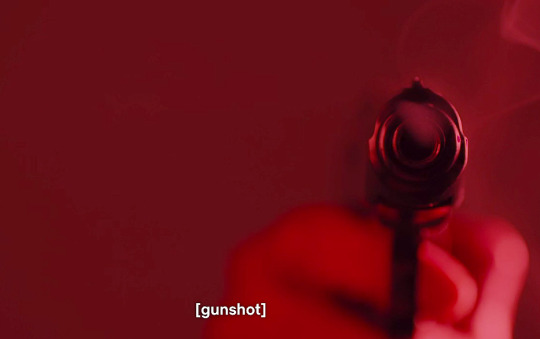
...is the same as in the beginning.

And the hand holding it seems like John’s hand.

John may write with his left hand, but he definitely shoots with his right. (Which by the way puts Eddie van Coon from TBB in another light. Hmm...)

The therapy session has come full circle, I believe. If Sherlock could kill himself with drugs, John could definitely do it with a gun. Let’s not forget that we have two suicidal protagonists in this show, which I read as a Romeo-and-Juliet kind of drama, interpreted by our favourite Drama Queen (hence the Shakespeare quotes in TLD and elsewhere :) ). John was suicidal already when he met Sherlock in ASiP, but Sherlock saved him merely by existing. And I think the key point here is what John says on his blog: #Sherlocklives means #Johnwatsonlives. But if Sherlock dies, so will John, most probably. So Sherlock has to stay alive to save John Watson from committing suicide, that’s the most important task that he has. And, as I’ve tried to show in earlier installments, he’s actually dying in S4. But he has to stay alive for John’s sake.
In conclusion, I think this is where Sherlock - in all honesty - has to admit that his ‘therapy sessions’ towards John don’t actually work; he’s definitely not a 'real’, competent therapist (which becomes glaringly obvious when Eurus/Elsa shoots John). Curing a limp and a tremor may be a good and useful thing, but it doesn’t actually deal with the kind of far deeper problems John and Sherlock have - both of them. Makes me wanna scream to him: “Give up, Sherlock! You’re not supposed to be John’s therapist; this is about you, not John!”
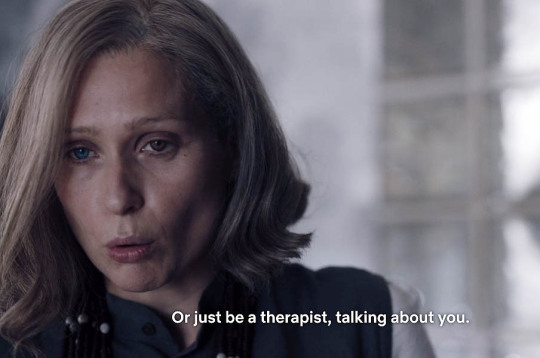

In my view, this is Sherlock expressing his frustration; he gets bored by his own fruitless scenario, and ends it all by shooting down his main ‘actor’. The session is over and we’re back to Square 1. Sherlock must now pass to the next level, go deeper still, facing his own demons. He’ll have to travel back in time, approaching his most traumatic memories. He must face Sister Sentiment...
But since this post is getting veeery long, I’m gonna have to save Sherlock’s experiments with Sister Sentiment for Part 2 of this installment. :)
(For more discussion about the therapists in BBC Sherlock, see @gosherlocked‘s meta on this topic, with additions.
(One of the best analyses of this episode that I’ve read so far was written by @loudest-subtext-in-tv immediately after TLD aired in 2017 (X).)
Tagging some people who might be interested: @raggedyblue @ebaeschnbliah @sarahthecoat @gosherlocked @loveismyrevolution @sagestreet @tjlcisthenewsexy @elldotsee @88thparallel @devoursjohnlock @sherlock-overflow-error
42 notes
·
View notes